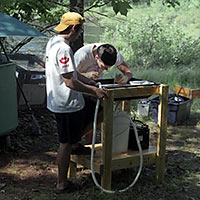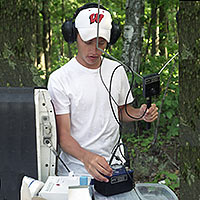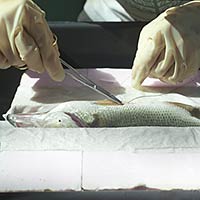Dances with Dragonflies: Agile Insect a Signal of Shoreline Health
“Ready for your first surgery of the day, Dr. Sass?”

Doctoral student Matt Helmus performs surgery on a largemouth bass. Undergraduate James Jenders assists.
“Ready as ever,” replies postdoctoral fellow Gregory Sass, snapping on some latex gloves. He’s speaking to undergraduate biologist Tyler Ahrenstorff, one of several students working for him this summer. It’s early morning and the researchers are busily preparing an outdoor “operating theater” along the banks of Little Rock Lake. Little Rock is a small body of water, renowned as the site of much groundbreaking limnology work.
Turning to a huge green tank filled with 500 gallons of water, Sass nets his first patient: a flopping largemouth bass.
Bad radio music blares in the background as Sass places the fish on the operating table and quells it with a common fish anesthetic. Pumping water through its gills all the while, Sass makes an abdominal incision and inserts a tiny radio transmitter that will track the fish's every movement. With the gadget inside, Sass deftly sews some tiny sutures. The “surgery” is complete.
Just minutes later, the fish is shakily coming back to life in the green tank.

Tracking antenna in hand, Tyler Ahrenstorff listens for the faint ping sounds that will help him follow the movements of transmitter-implanted fish.
"One down, nine more to go," says Ahrenstorff, who spent the better part of the past school year securing grant money to purchase 20 $200 radio transmitters. Part of an independent study project, the instruments will enable Ahrenstorff to track largemouth bass movements for up to 90 days. The results, he hopes, will build on an innovative experiment Sass has been working on for five years.
About a ten-minute drive from Trout Lake Station, Little Rock Lake is famous as the site of a 15-year simulation experiment in which UW-Madison scientists incrementally acidified the lake to mimic and monitor the effects of acid rain on ecosystems.
Now, the lake is earning further renown for another manipulative experiment Sass and others started around 2000. For two months and about $10,000, the researchers removed fallen, floating logs from the Little Rock shoreline.
"We knew a lot about woody habitats in rivers and streams but almost nothing in lakes," says Sass during a boat ride around Little Rock. "We really wanted to understand how wood plays a direct role in lake ecosystems." To create a control site, the scientists added wood to Camp Lake, another small lake in the area.
The results of the exercise have been dramatic. With the logs gone, population levels of Little Rock’s dominant fish species, largemouth bass and perch, went haywire. The perch lost valuable hiding places and were quickly devoured by the bass. As perch populations shrank, however, the increasingly hungry bass were forced to resort to terrestrial food such as dragonflies, mice and even snakes.
Over the years, the bass have begun to shrink. There are also fewer turtles, herons have no perching spots, and loons have nowhere to nest. The sundew, a rare carnivorous plant that grows only on floating lake wood, is also dying away. "This is a direct experiment that shows that when you pull a habitat apart, you're going to lose species," says Sass.
Moving the logs also caused lake mercury levels to jump, as old mercury-coated sediments rose to the surface. Once mercury gets into fish tissue, it can cause serious neurological damage, Sass says.
The work has important applications for Vilas County lakeshore development policies, where current policy makes little ecological sense, according to Sass. "You don't get fined to take wood out of lakes, but you do get fined for putting it in since it’s considered a navigational hazard," says Sass. "But that's just giving more power to land owners. People with houses on the lakes often have boat docks that extend all the way out into the water, so what's wrong with putting in a few logs?”
Sass recommends that certain areas around the North Woods be listed as critical habitat. Alternatively, developers could ensure that one side of lake always remains untouched.

Sewing tiny sutures after implanting a radio transmitter in a largemouth bass.
Back at shore, Ahrenstorff and four other students have inserted five more transmitters. Everyone has taken a turn at fish surgery. When doctoral student Matt Helmus steps to the table he jokes, "Why didn’t we just become vets or doctors or something? We could be making billions doing this!"
"Well, how many people get to perform surgeries outside, under beautiful trees?" Sass replies.
Helmus looks up from his fish and smiles. "You're right, I'm really not complaining."